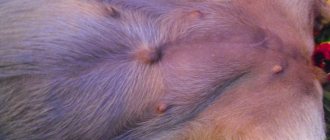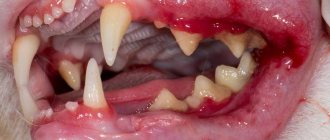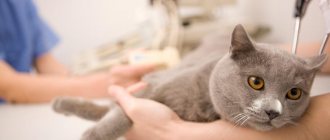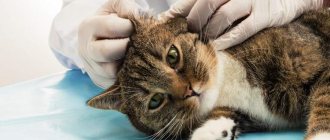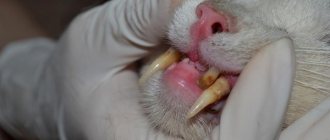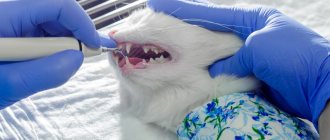Save the article:
No matter how interesting the word halitosis sounds, it means nothing more than a disorder in a pet’s body, characterizing the smell of a cat’s breath . Ideally, no unpleasant odor should be heard from the mouth of a healthy animal: acetone or ammonia indicate a deviation from the norm.
The mouth of a meowing pet is home to many bacteria, both pathogenic and beneficial. The latter help maintain the normal condition of the oral cavity, inhibiting the growth of bad micro-residents, and a violation of this balance brings not only an unpleasant stench from the mouth, but also health problems.
Causes of bad breath in cats
If suddenly your pet opens its mouth, and from there comes the aroma of the Kraken’s mouth, then you urgently need to figure out why the cat has bad breath:
- Age: most often this attack occurs in young animals aged 1-3 years. If a “charming” amber is heard from an elderly cat, the cause is probably a disruption in the functioning of the internal organs.
- Changing baby teeth to permanent teeth: halitosis in kittens is quite rare, but it does happen during the period of teeth change.
- Oral diseases: gingivitis, caries, pharyngitis, stomatitis, cysts and other diseases often smell bad.
- Breed: Brachycephalic breeds (cats with a flattened face) also often cause their owners to suffer from bad breath.
- Problems with internal organs: diseased kidneys, liver, gastrointestinal tract, upper respiratory tract - any organ can betray its illness in this way.
- Inflammation: Any inflammation, from the lungs to an abscess in the oral cavity, can manifest itself as a stench.
- Helminths: as a result of the activity of bacteria, a cat’s mouth develops a bad odor.
Based on the above reasons, it becomes clear that the pet needs to be examined by a veterinarian.
Prevention
And in conclusion, I would like to say: no better treatment has been invented than prevention:
- constantly monitor the health of your pet;
- brush his teeth with gels and pastes;
- buy special food to combat halitosis;
- Have your pet examined by professionals periodically;
- carry out preventive deworming;
- don't let it get too cold.
Then many health problems, including bad breath, will definitely pass by your pet, and you won’t have to worry about trifles.
Diagnosis of bad odor from a cat's mouth
global $ads_google;
//data-ad-slot=”2475549904″ $ads_google = empty($ads_google) ? false : true; ?> if ($ads_google == false) {?> $ads_google = true; ?> } ?> By the specific smell coming from the pet’s mouth, you can determine the organ that is malfunctioning:
- Smells of acetone: If your cat smells of acetone from its mouth, and this is accompanied by copious amounts of water, the most likely cause is diabetes. Carbohydrates are not digested, and due to the breakdown of fats, ketone bodies that smell like acetone are formed;
- rotten smell of rot: it makes sense to worm the cat. The cause may also be a disease of the digestive system. The stomach may fail because it cannot cope with the cat’s diet;
- ammonia: problems with the kidneys or other organs of the genitourinary system.
- fishy smell: the probable cause is poor oral hygiene and dental disease.
Whatever the cat’s breath stinks , a veterinarian can identify the true cause and prescribe treatment not for the symptom, but for the disease itself.
Learn more about the causes of unpleasant odor
- When changing teeth . During this period, kittens may experience concomitant inflammatory processes, characterized by redness of the gums around the dental bed (red border). An unpleasant and unusual odor at this time is considered normal and does not require any intervention. An exception is when the permanent tooth is growing, but the baby tooth has not yet fallen out, or when the permanent tooth cannot erupt. The inflammatory process worsens, the stench intensifies.
- Poor quality nutrition and/or cheap dry food . A cat can climb into the garbage and grab something from it - the smell from its mouth will eloquently “tell” about this. Also, cheap dry food gives an unpleasant tint to the animals' breath.
- Foreign bodies in the oral cavity . Foreign objects (bones, threads, pieces of ears of corn, etc.) get stuck between the teeth, injuring the gums, the inner surface of the cheeks, pharynx or palate, provoking an inflammatory process, the addition of microorganisms and a characteristic odor.
- Viral and bacterial infections . Cats suffer from calicivirus or rhinotracheitis - a disease accompanied by damage to the oral cavity, active salivation, ulcers on the mucous membrane and an unpleasant odor. In addition to all of the above, the animal will be depressed, and there may be an increase in body temperature, and stomatitis will occur.
- Diseases of the masticatory apparatus . Any dental diseases (caries, fractures, loss, tartar or plaque) are always accompanied by an unpleasant (usually slightly putrid) odor due to the active inflammatory process and the development of microorganisms.
- Pathologies of the salivary glands . There are diseases in which not enough saliva is produced or, conversely, too much. With a lack of saliva, excessive friction of food against the oral mucosa occurs and damage to the palate, cheeks, gums and tongue occurs with the development of an inflammatory process. With an excess of saliva, irritation of the lips and gums of the lower jaw occurs, the hair around it becomes wet, microorganisms begin to develop, which can also cause an unpleasant odor.
- Tumors and neoplasms in the oral cavity can also cause bad breath from a cat. This reason appears extremely rarely, but still occurs. This is especially true for malignant tumors in the last stages (for example, the tongue or soft palate), when tissue decay begins and bleeding is observed.
- Internal systemic diseases . Many internal pathologies of systems and organs are accompanied by a special odor from the mouth that is characteristic of this particular disease. For example, diseases of the kidneys and urinary system are in most cases accompanied by ammonia breath in a cat; with pathologies of the gastrointestinal tract, the smell may be putrid or sour, etc.
- Poor oral hygiene . If the cat has an incorrect bite and is feeding soft food, sometimes it becomes necessary to clean the cat’s teeth from plaque, which can give a constant unpleasant odor from the mouth.
Reviews from veterinarians about halitosis
Veterinarians often encounter an unpleasant odor from the mouths of cats. The reason for this is often an incorrectly formulated pet diet, which leads to diseases of the stomach, liver, kidneys, and poor oral care of animals.
The owner will definitely be consulted on the proper nutrition of the cat. If the cause of the stench turns out to be poor hygiene, the specialist will recommend brushing the cat’s teeth regularly.
How to get rid of the problem
Often, cats have bad breath due to the fact that the pet was given the wrong food. In this case, to get rid of the smell, you will have to adjust the menu.
Also, all kinds of gels, sprays, powders and tablets that will help remove the odor, disinfect the oral cavity and destroy plaque on the teeth are great for getting rid of bad breath.
Important! Veterinarians do not recommend frequently using odor removal products, as they can trigger the development of allergies in the animal.
A diagnosis can only be made through an examination by a veterinarian, as well as a number of additional tests and studies. The doctor takes a medical history, taking into account the symptoms associated with the unpleasant odor, the age of the pet, and its lifestyle.
A cat's bad breath is a vital indicator of its health that should not be overlooked. Normally, the oral cavity of animals does not have any odors, while the presence of stench is a consequence of a certain imbalance in the pet’s body. The reasons may lie both in an incorrect diet and in more global disorders in the functioning of organs. There is no universal way to get rid of a pungent odor, so you must first go through all the tests with your cat that the veterinarian will prescribe. The outcome of further treatment will depend on them. Read on to learn about the causes of bad breath and what types there are.
Treating cat bad breath
You should not listen carefully to the words of your cat-loving neighbor, who cured his purring dog’s mouth stench in some way. The causes of the problem can be completely different, so the first thing you should do is visit a veterinarian: after the appointment, it will be clear on what principle to treat the disease.
If the trouble was caused by an incorrect menu, then the first thing you need to do is balance your diet. The doctor will prescribe medications that will help eliminate the cause.
Problems with metabolism will be revealed by a blood, urine and stool test, as well as a swab of the oral mucosa. An additional symptom will be diarrhea in the cat or rare bowel movements. The diet will require the exclusion of economy-class feed and food from the host’s table.
If diabetes is suspected, it will require lifelong therapy and veterinary supervision.
If problems with internal organs or chronic diseases are indicated, an ultrasound scan or x-ray is taken.
Sometimes it is difficult to independently assess the condition of the oral cavity, so the cat is shown to a specialist: if periodontitis, tumors, caries, or excessively grown tartar are detected, qualified treatment methods will be taken.
What to do if your cat has bad breath
It is important to understand that it is impossible to simply eliminate the stench from the mouth as such. The smell will go away on its own, but only when the main cause that caused it is eliminated.
If you begin to smell an unpleasant odor from your pet’s mouth, seek advice and qualified help from a veterinarian. This phenomenon can be the cause of a serious systemic disease, which is simply impossible for a person without special education and skills to identify and treat at home! Treatment is prescribed only by a specialist!
- If wounds or ulcers are found along with the smell, you can treat them yourself with antiseptic agents (for example, wipe with miramistin). But a visit to the veterinarian is mandatory, because... the presence of wounds and ulcers in the oral cavity is typical for some viral infections - local treatments alone may not be enough.
- If there is plaque on your teeth, you can clean it with the help of improvised means - ordinary wet soda and a finger with a bandage wrapped around it. You can purchase special pastes or powders for cleaning pets’ teeth at special pet stores or pet pharmacies.
- If you find dense tartar, you should contact a specialist to remove it.
- If you find foreign objects in your gums, you can try to remove them yourself. If you have difficulties with this, it is better to seek help from a specialist so as not to cause additional harm and pain to your pet.
- If an unusual odor has been detected from the cat’s mouth, but no potential causes are apparent externally (at the owner’s first glance), then a visit to the veterinarian cannot be postponed!
How to remove odor from a cat's mouth
In the case where the cause of a cat’s bad breath is a disease of the cat’s mucous membrane or tartar, then you can cope on your own: brushes and gels can and should be purchased at the veterinary pharmacy that can and should be used to clean the cat’s teeth. It is better to accustom your pet to cleaning from childhood, but if the moment is missed, you will still have to start.
If the examination reveals wounds, then they must be regularly treated with miramistin or hydrogen peroxide 3%: after such simple steps, there is a chance that the cat will have much less bad breath if the cause is wounds or diseases of the oral cavity.
Remedies for cat bad breath
global $ads_google;
//data-ad-slot=”2475549904″ $ads_google = empty($ads_google) ? false : true; ?> if ($ads_google == false) {?> $ads_google = true; ?> } ?> There are several remedies that can help if your cat’s breath stinks.
Fresh Breath Tablets - Beafar company offers products containing chlorophyll. The medicine acts as a disinfectant on the mucous membranes of the mouth and is easily combined with food. The pet is given 2 tablets per day, one in the morning feeding, the second in the evening. The pack contains 40 tablets, the price of the medicine is about 500-800 rubles.
Another product with a lot of positive reviews is called Api-San spray or gel “Zubastic”. The medicine costs about 200-250 rubles. Instructions for use: apply the product only from the factory bottle 2-3 times a day for one or two weeks. Since the animal will experience profuse salivation in the first half hour, food is offered no earlier than 30 minutes after treatment.
Mouth Odor Control Spray is suitable for use on cats. The medication acts by destroying tartar, whitening teeth and strengthening gums. The stench that appears due to lack of oral hygiene is eliminated without harm to the animal’s health. You can spend about 200-250 rubles on the drug Cliny.
Gel Dentavedin is an anti-inflammatory and disinfectant for the care of the oral cavity in cats. By combating gram negative/positive bacteria, yeast and dermaphytes. The gel is rubbed into the gums and teeth. Feed the pussy only half an hour after the procedure. The cost of the drug is on average 70 rubles.
Timely care of the animal’s health will prevent the appearance of a bad odor from the pet’s mouth.
How to deal with halitosis
It is clear that the above-described cases of bad breath in cats should be dealt with by a veterinarian who can choose the right treatment and help balance the diet.
But most often the cause of the smell is problems with the teeth and oral mucosa, some of which the owner himself can solve.
You can remove tartar or plaque using special brushes and gels that are sold at a veterinary pharmacy. The procedure can hardly be called pleasant for the cat; it is unlikely that it will be able to withstand it with dignity, but for the sake of the pet’s health, the owner will have to be patient. If you teach your cat to brush her teeth from childhood, she will be able to get used to it, and will no longer react so sharply and aggressively to the owner approaching her with tools.
Of course, in advanced cases, when neither a brush nor a paste helps, and more serious dental problems (caries, tumors, periodontitis, etc.) are mixed with plaque, you will have to take your pet to a dentist, or simply to doctor. A specialist under anesthesia will be able to remove severely overgrown tartar, cure caries and carry out other procedures that can alleviate the pet’s condition.
During periodic brushing of your teeth, you should pay attention to the condition of the oral cavity: whether there is plaque on the tongue, whether there are ulcers or injuries. Indeed, in most cases, it is in them that harmful microflora develops, which leads to unpleasant consequences. Damaged areas of the oral mucosa, if any, can and should be treated with any antiseptic that is in the medicine cabinet and that can be used in the mouth. For example, ordinary medical chlorhexidine (Miramistin) will perfectly solve the problem of oral ulceration, and at the same time will not allow anaerobic microflora to multiply.
What does the smell tell you?
Having discovered that a pet has a foul odor from the pet's mouth, the owner can also pay attention to its character. Often, “aromatic” nuances can suggest where exactly the main problem lies:
- Gastritis, stomach ulcers, and diseases of the esophagus can signal themselves with a putrid odor.
Organs of the digestive system in cats
- A sweetish odor is observed in liver diseases.
- A pungent ammonia smell is observed in cases of kidney problems: renal failure, urolithiasis, nephritis, which are often accompanied by halitosis in the pet.
- The smell of acetone or overripe apples is characteristic of a systemic disease such as diabetes.
- If your cat's breath smells rotten, there is a high probability that the cause is dental problems or digestive diseases.
Of course, it is impossible to make a diagnosis based solely on the specifics of the stench. The owner needs to look for other symptoms besides bad breath and conduct a clinical examination at a veterinary clinic.
Watch this video about the causes of bad breath in cats:
Why does my cat's breath smell like rotten meat, a putrid odor has appeared?
If a cat’s breath smells like rotten meat or a putrid odor appears, then in most cases the causes are diseases of the digestive system. With gastritis, stomach ulcers, and diseases of the duodenum, due to impaired fermentation of protein products, fermentation and putrefaction processes develop, which cause halitosis. With liver disease, the owner often detects a putrid odor with a sweetish tint from the pet.
Along with halitosis, in diseases of the gastrointestinal tract, the animal experiences diarrhea, constipation, vomiting, etc.
What does the smell of acetone tell you?
If your pet smells of acetone, then it is necessary to conduct a biochemical blood test and rule out diabetes mellitus. With this pathology, a metabolic disorder occurs, ketone bodies enter the blood, which causes the specific smell of overripe apples.
The mechanism of acetone formation in diabetes
What causes a cat's breath to smell like fish?
If your cat's breath smells like fish, food may be the cause. If the basis of the animal’s diet is fish products, then the smell will be appropriate. Some mass-market ready-made dry foods containing low-quality proteins also lead to an unpleasant odor.
The cat's breath smells like urine: what caused the odor?
If your cat's breath smells like urine, then it is necessary to rule out life-threatening kidney failure. The development of uremia due to kidney failure leads to the smell of urine coming from the animal’s mouth and fur. If a symptom is detected, the animal should be immediately shown to a veterinarian.
Why does my cat's breath smell like garbage?
Your cat's breath may smell like garbage due to the condition of its teeth. With tartar and caries, a large amount of pathogenic microflora accumulates in the oral cavity, which actively multiplies on food debris. The inflammatory process is accompanied by the appearance of a stench in the cat.
What causes a cat's breath to smell of ammonia and sweet aromas?
Having discovered that a cat's breath smells of ammonia, the owner should be aware that the cause of this phenomenon may be problems with the kidneys and liver. In case of renal failure, pyelonephritis, glomerulonephritis, polycystic kidney disease, the filtration of primary urine occurs, and the products of nitrogen metabolism enter the blood.
A) Normal kidney; B) the initial stage of polycystic kidney disease with minimal changes in the parenchyma in the form of small cavities; B) the final stage of PKP, when the parenchyma is completely replaced by cystic cavities
The cat's smell may change due to the presence of a neoplasm. Tumors, especially of a malignant nature, are characterized by changes in metabolism, the entry of toxins and tissue breakdown products into the bloodstream. These processes are often accompanied by halitosis in animals.
In some cases, diseases of the respiratory system - pharyngitis, bronchitis, pneumonia - may also be accompanied by bad breath as a result of the inflammatory process.




